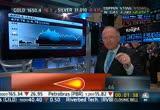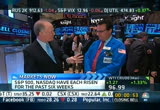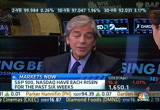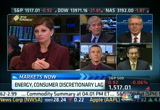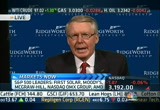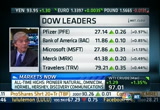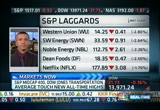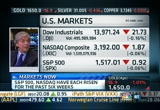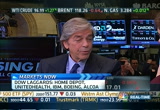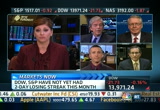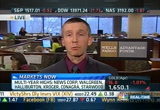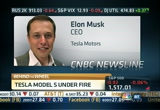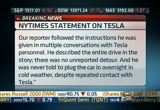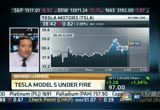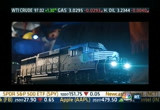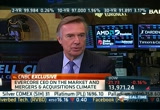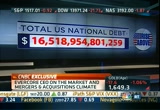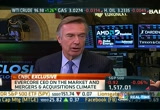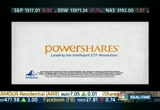tv Closing Bell With Maria Bartiromo CNBC February 11, 2013 4:00pm-5:00pm EST
4:00 pm
with apple stock up about .5% right now, we just learned that tim cooke will be seated next to michelle obama at the president's state of the union address tomorrow night in washington, d.c. that should be very interesting. i wonder what that's going to be about. the stock up 1% today. the dow lower. we're coming off the low right now. i pointed out earlier that the s&p has been down every monday this year. that's five trading days. here's what the s&p has done year to date. we don't get the knnuances of t trading here. but so far up 6 1/3%. peter costa -- >> yes. >> you've told us as a skeptic you threw in the towel recently and were willing to buy this market. >> it was right after i spoke to ralph. >> he considered you to turn bullish. >> he did. >> but you have to admit this market is getting tired here,
4:01 pm
don't you think? >> if you look at the market where we're down 19 today, i think we'll churn a bit. i think this churning might go on for probably another couple of months. but i don't think the market's -- it's not done yet. i just think that right now we're going to be in a pausing phase. and i do think at some point in the next two to three months -- >> you don't see a correction in the meantime? >> a 5% correction. to me that's a buying opportunity. >> very good. thank you, peter. >> thank you. >> the camera's off us because they put it up on the balcony there at the new york stock exchange where the swim suit models are ringing the closing bell. somewhere in there also is ceo of the new york stock exchange. one of the tough job he's got here. here's the second hour now with maria. i'll see you tomorrow. . and it is 4:00 on wall street. do you know where your money is? welcome back to "the closing bell." i'm maria bartiromo. stocks carrying losses today.
4:02 pm
take a look how we're settling on the street today for monday. the dow industrial average down to 13,970. nasdaq down about two points on the session although along with the s&p and the dow came roaring back from the lows that were hit at about 10:00 a.m. this morning. joining me todd morgan, allan gayle, brian jacobson, and our own rick santelli. thank you very joining us. todd, good to see you. we've been trying to figure out if there is a trend, money coming out of fixed income finding a home in stocks given the fact we've had such a great beginning of the year. is that where the money is coming from? do you believe in this trend? >> i absolute do believe in this trend. it's coming both from bonds and cash. and we're seeing a remarkable amount of money come out and move to more risk assets. and it's the first time we've seen this in probably five, six
4:03 pm
years. >> this is the first time we've seen it, so that's why there's a debate on wlorhether or not thi money is new money or this rotation has begun. are you part of that? have you rotated? >> we have rotated a small amount. we've taken 5%, 10% out of bond portfolios and moved to equities. it doesn't take much. the statistics say something like $600 billion came out of bond funds in the last five years. in the last month we've only seen $35 becoillion go back. so there's a lot of ammunition left to keep this momentum going. >> i understand the potential if in fact we were to see this trade actually materialize and keep going. now, rick santelli, we talked about this last week. you didn't think the money was coming out of bonds. >> no. i just think more money may be finding its way into the equities sector, but it doesn't seem to be at the defense.
4:04 pm
none of that includes ou the daisy chain of $85 billion a month in fed purchases should be handicapped in the grand scheme of those that follow flows from investors, traditional investors, not the fed. into e the rkt markets. the market speaks for itself. if you check at the rates, this is the 12th day in the road to close in the six basis point range going back to the 25th an january. where we are seeing less interest is in things like high yield. several etfs. this one the hyg continually makes new every day as of late. >> where are you on this? >> well, thank you for having me on the show, maria. i am increasing my equity ex exposu exposure. i think there is possibly some
4:05 pm
money coming from bonds. but i'm hesitant to draw a trend line through one month of data. clearly i agree with the other comments that there's a lot of money yet to come. i think it will come. particularly as rates start to rise and people start to lose money in bonds. but i think it's a little too early to declare one month a trend. >> we're seeing a lot of money come out of cash in addition. there's a lot of cash sitting on the sidelines that's earning no return. in fact, if you take a look at it on an after tax basis and after inflation, they're losing money. people are feeling much more confident now. we're seeing the money go back into equities for the first time in a long time. and it's happening to us in our firm. we're seeing people get out of longer term holdings of municipal bonds and others and taking 10% or 15% and putting their toe in the water for risk assets and diversify. >> and i think what alan is saying is once people look at the statements and figure out they've made money in stocks and
4:06 pm
lost money in bonds that trend may very well pick up. brian jacobson, where are you on this? and how do you want to be allocating money right now? >> i agree that this -- it's a little more premature to call this a trepd. great squeezing to have an effect. a lot of this is probably coming out of money market type instruments. people are getting skittish about longer term rates. they recognize that suddenly the 10-year treasury goes above 2, you could lose money. january and april are historically strong months for equity flows. i think we really need to wait to see whether or not this trend continues into february before we say people are squeezed into equities at this point. >> that's because january is usually a strong month. because you've got lots of early new money at the beginning of the year coming in from 401(k)s and e pension plans. >> you've got bonuses being
4:07 pm
paid, 401(k) rebalancings. then people making contributions to iras and 401(k)s. there are seasonal reasons for it, that's why i think it's early to say. but that is something i'm looking for over the longer term. people beginning to take on a little bit more risk. let's face it, that's what the fed wants. that's what the fed's going to get. >> what do you want to do? say i believe this trend and want to get in this move. already missed some of it. how do i want to allocate capital and stocks? >> you have to decide if you're a long-term investor or short-term. i don't know what to do if you're out a month or to. >> but long-term? >> you definitely should change your asset allocation. it's been 12 years, the market's gone nowhere. nowhere. and earnings have doubled. and there are signs now that people's confidence has changed and increased. we're seeing at our firm wealthy individuals taking 20% of money out of bonds and putting them in riskier assets. it's not something we're
4:08 pm
thinking might happen. we're seeing the reality and the change. people are comfortable. they've been in the bunker for five or six years. following the fiscal cliff year end problem, people have a higher degree of confidence. and like you said in january with these numbers improving, it's giving a greater catalyst for people to move. >> are there areas you see sort of a consistent commitment to? financial services had a great year last year but now there's all sorts of debates on whether or not to buy the banks here. given be seeing the structural change -- and it's harder for them to make money where the rates are. so are there areas in this market where you're seeing consistent commitment? >> we are recommending people go in large cap multinational high paying stocks. the wealthy people are looking at singles and doubles. number two, we like emerging markets. and number three, we like structured credit. those are the three areas we like. i think you'll get a multiple of what you get in the bond market. without a big move.
4:09 pm
remember if stocks go up, people double their money. >> does everybody else agree with that in terms of multinationals that pay dividends? that's the sweet spot of equities right now? >> not entirely. i think you do want to be looking at some multinationals. i wouldn't just go looking for yield. if you look at utilities that got to be a crowded trade. i think what you need to do is look at the corporate governance issue. are they reinvesting in the business for growth? i actually think the big surprise for a lot of people is how strong growth could actually be. not necessarily those that pay a dividend, but those that create shareholder value. >> that would be something we want to see given we've been on this stagnant move. final word here, go ahead, sir. >> maria, one thing. we forget demographics. they talk about the fed pushing on a string relative to interest rates where the inflation rate
4:10 pm
is. but demographics, there's a huge swath to this country that no matter how you make the only game in town, they're going to stick with their investments because of where they are in the maturity cycle of their own lives. >> yeah. that's a fair point. absolutely. >> until it starts creeping up. once it starts to creep up and people get their statements, people are going to become worried. if the bond market moves 50 basis points, people are going to lose their whole coupon for the year. >> great point. we'll leave it there. >> let's face it. it's not just demographics. >> final word really. go ahead. >> sure. it's not just about demographics. let's face it. some of those investors recognizing they're going to be living longer. perhaps facing 30 years in retirement. they're going to get comfortable with holding equitieequities. >> we'll leave it there. thank you so much. we'll see you soon. earlier on the program tesla founder elon musk calling in
4:11 pm
disputing a "new york times" report that the car failed when it comes to range anxiety. phil lebeau following the story. over to you, phil. >> quite the war of words this afternoon regarding the model s and the review in the "new york times." let's set the stage with this picture that ran in "the new york times" showing reporter john broder as his model s that he was test driving, it ran out of battery power well short of its destination as he was driving it from washington, d.c. up to new york. he wrote in the review it didn't follow -- didn't reach the expectations. and when we ran this story on "street signs," elon musk called in a short time later saying they didn't follow the instructions for the test drive. >> we explicitly said that to do this trip he needs to make sure he's fully charged when he starts up, that he doesn't take detours, and that he drives at a reasonable speed.
4:12 pm
i'm not talking about, you know, some ridiculously low speed. i'm talking about, you know, at least not too far above the speed limit. and none of those three things were done. >> elon musk earlier on the can b. "the new york times" responded to our request for comment. it says the times article on february 11th recounting a reporter's test drive in a tesla model s was completely factual describing the trip in detail exactly as it occurred. any suggestion that the account was fake is untrue. he described the entire drive in the story. there was no unreported detour. he was never told to plug the car in overnight in cold weather despite repeated contact with tesla. elon musk on "the closing bell" earlier said they've put in data logs in their model ss because they've had incidents where
4:13 pm
reporters have not been accurate in their reporting. >> for media test drives after we had a really bad experience a few years ago with top gear where top gear pretended that our car ran out of charge and had to be pushed home and then we looked at the vehicle logs and it turned out it had something like 50 miles of range left. they basically faked it. >> elon musk on "the closing bell." if you look at shares of tesla, the stock was under pressure most of the day after hitting an all-time high last week. the bottom line, this was not plenty to read if you're an tesla employee. they've got earnings coming up soon. and a lot of people are saying they have got to show that the model s will deliver. you heard elon musk coming on today saying it delivers. >> all right, phil. thank you so much. phil lebeau with the latest
4:14 pm
there. we'll keep following that story. if you've pumped gas this year, you know prices are moving up fast. gasoline prices jumping almost 25 cents a gallon over the last two weeks. we'll get the latest after that. then another threat in the economy marktss. we'll talk to the president's top economic adviser gene sperling on what it will take to get a deal. also here with us gop representative tom cole who says nothing will pass with new taxes in it. stay with us. ♪
4:15 pm
(train horn) vo: wherever our trains go, the economy comes to life. norfolk southern. one line, infinite possibilities. [ engine turns over ] [ male announcer ] we created the luxury crossover and kept turning the page, writing the next chapter for the rx and lexus. this is the pursuit of perfection.
4:17 pm
welcome back. more pain at the pump with gasoline price it is rising. over to you, sharon. >> we're looking at gas prices nearly $3.60 for the national average. up 28 cents in the past month. now, that's the bad news. the good news is we saw a slide in gasoline future es today. they believe with the storm in the northeast a lot of cars not on the road, we're going to see a serious decrease in demand this week. that could translate to lower prices at the pump. but traders say that may only be temporary. more pain in several weeks
4:18 pm
if the white house and congress cannot come out with a deal to avoid automatic spending cuts called sequestration. something congressional republicans say they will not agree to. i'm joined now from the white house by gene sperling. he's assistant to the president for economic policy. good to see you, gene. >> thanks for having us. >> so what do you think? will these cuts kick in? >> i think it will be unnecessary. we already cut $2 billion from the deficit. the president is serious enough about his desire to close the deal that he's been willing to keep his offer to speaker boehner on the table. so i think if we could come together and compromise, we could get the rest of the way there and stabilizing our debt, bringing our deficits way below 3% of gdp. and i think it would be unfortunate for anyone at this
4:19 pm
point to start saying that they should take an absolutist position. they can't have a penny of reven revenue. $800 billion in expenditures and loopholes that could be used to reduce the deficit. how can it be now there's not one penny? that you have to do it all in medicare, education, medicaid, but you can't find one penny of a loophole, tax expenditure even for the most well off american that could be part of a deficit reduction package. >> couldn't the other side have said that to you back in january when they actually raised taxes but they got -- they didn't get revenue? i'm sorry. they didn't get any cuts? so it's the same thing, right? because the republicans will say we already did that. we already went through the raising of the revenue. >> let's not have too short-term memory here. what's right is that we did have
4:20 pm
back in 2011 we had an all-spending cut agreement. >> but we both know those spending cuts -- those are spending cuts expected on what was about to be put into place in terms of cuts. >> no, no. >> gene, the deficit -- the debt is still $16.5 trillion. so where are the cuts? >> maria, we have put into law the budget control act. i'm not talking about the sequester. it put in over a trillion dollars of spending cuts that is the law of the land both parties are living by right now. we have basically $2.5 trillion of reduction and only $600 billion, 25% of that is in revenue. we've done all spending cuts once. we've done some revenues. we should be trying to find a balanced way forward. and i think that is what the public needs. that's the spirit of the bowles simpson framework that was put forward which was both revenue reform and tax reform that both --
4:21 pm
>> this is not bowles simpson though. >> it is in the following way, maria. in the sense that both sides needed to compromise and that you needed to have both entitlement reform that lowered the deficit and tax reform that lowered the deficit. all the republicans need to do to keep the process of bipartisan compromise going forward is to recognize that there is some room to have revenue raisers as part of tax reform together with entitlement and not say to the american public that the only way forward for deficit reduction is medicare cuts, medicaid cuts, education wsh there's not one penny of revenue increases that you could have as part of the plan going forward. >> you just said yourself that we need to see a balanced approach including entitlement reform. so where's that? >> i'm happy you asked. in the agreement to speaker boehner, the president had $400 billion in medicare savings that he put forward. $400 billion.
4:22 pm
he had not $200 million in entitlement reform. he said even if we could get the big deal together that he'd be willing to do the adjustment which is politically difficult. that's a very significant agreement. in fact, in his offer to speaker boehner he had interest savings well over a trillion in additional spending cuts. that's still on the table, but it needs to be balanced. it needs to include revenues that can be increased by closing tax expenditures and loopholes. and that's what speaker boehner was talking about not that long ago when he was willing to put a trillion dollars of revenue on the table. so we're just trying to work together to get compromise. >> i feel like we've been talking about this revenue that could come from closed loopholes for a long time. how come it hasn't been done yet? >> well, there's a lot of things in our country that need to get done. and the question is making progress. we have done $2.5 trillion in deficit. it's brought the deficit down, but not enough.
4:23 pm
we're not under 3% as a percentage of our economy and our -- >> gene, we still have $16.5 trillion in debt. let's talk about the here and now. the $16.5 trillion in debt. it's getting higher, not lower. our audience knows this. >> marimaria, obviously your audience what they care about is as a country to have a stable debt as a percentage of their economy. is their deficit below 3% so that your debt as a percentage of your economy is coming down and stabilized. that's what gives people confidence to invest. and that's been the goal i think of both parties. now, we have lowered the deficit. the projection of deficit as percentage of our economy. but we're seeing it's not enough. that's why this president is willing to go forward with an additional $1.8 trillion in deficit reduction which is what was the remaining amount that was on the table when he was
4:24 pm
speaking with speaker boehner and negotiating. now, the president's still willing to put that offer on the table with all the difficult entitlement savings, $400 billion in medicare that would help us make more progress on the deficit. and the question is are we going to go back to people taking all or nothing positions ab absolutist positions where people want 100% or they're going to shut down the government, not pay or bills, have an automatic harsh spending cut come in that would hurt defense, education, technology. we don't need to do that. we can compromise and work together. >> to me it sounds like you're all or nothing. because we just got higher taxes in january and now you want more revenue and you're not making a case for real reform of entitlements. that's the issue, gene. >> maria, you need to listen. you need to listen here, okay? i've just said that we had $400 million in savings. that we were offering to adjust
4:25 pm
the cpi which would in the second decade have $800 billion in savings. what we've said is it needs to be part of a balanced package that includes tax reform that raises revenues and lowers with entitlement reform. that is the framework of bowles simpson. it's the general framework of compromise. an absolutist position would be for us to say we want nothing but revenues. for them to say they want nothing but spending cuts. >> you said that at the end of the year, remember? >> no, we didn't. >> and taxes went up and there were no spending cuts. >> that's not right. >> i don't want to go in circles. >> that's not right. >> okay. >> we were at the table with speaker boehner. with did not want an all-revenue deal. we wanted a broad package to include serious entitlement reforms. the speaker made the decision to leave those negotiations and that's what led to the form of the fiscal cliff deal.
4:26 pm
our negotiations was to get a broad package that had significant entitlement reforms together with revenue. so i think an accurate portrayal of what happened was this has always been for balance growth, ask both sides to come together. and with divided government if you care about moving the country forward, you're going to need that compromise. >> let me switch gears here and ask you a question. we want to ask you about the news item that crass crossed in the last half an hour. that tim cook will be sitting with the first lady at the state of the union tomorrow night. apple is a great company, but why was he chosen to sit with the first lady? >> well, as you said apple is a great american country and it stands for our sense of innovation, entrepreneurship, risk taking. i think that's quite an appropriate person to be in the first lady's box when the president is talking about our economic future and the importance of job creation,
4:27 pm
manufacturing, innovation, and how we create strong middle class jobs with real growth that benefits all americans. >> i'm glad you mentioned manufacturing, gene. apple outsources thousands of jobs to china. it is also right now the main facility, the fox con facility as i'm sure you're aware has major human rights questions about how the workers are treated. that's where i was going with that, gene. it was interesting that apple's ceo tim cook was chosen given the thousands of jobs outsourced to china. >> well, you know, we have all sorts of people. we sometimes have republican members in our box. we have ceos in our box. it doesn't mean we agree with every single thing they believe in or everything they company does. but they did make an announcement recently that they will create maps in the united states. and we want to give encourage to any company whenever possible to
4:28 pm
manufacture in thenitis. we think the economics work more in the favor of bringing jobs back. >> but that's not what they're doing. >> and we want to encourage that. >> it's just a start, but we'd like to start to become a trend for apple and other companies. that will be something the president, you know, has addressed and will continue to address. >> gene, it's great to have you on the program. thank you so much. >> thanks, maria. >> gene sperling joining us from the white house. my interview with representative tom cole is coming up in a few minutes. he's warning house republicans will not accept any new taxes or deductions as part of a way to avoid automatic spending cuts. join us for part two of our interview on sequestration. find out why the head of ever core partners says there is no correction in sight. we'll talk about that. later, the pope stepping down. that hasn't happened in 600 years, literally. reaction from italy. stay with us. i know what you're thinking...
4:30 pm
transit fares! as in the 37 billion transit fares we help collect each year. no? oh, right. you're thinking of the 1.6 million daily customer care interactions xerox handles. or the 900 million health insurance claims we process. so, it's no surprise to you that companies depend on today's xerox for services that simplify how work gets done. which is...pretty much what we've always stood for. with xerox, you're ready for real business. tdd#: 1-800-345-2550 tdd#: 1-800-345-2550 and the streetsmart edge trading platform from charles schwab... tdd#: 1-800-345-2550 gives me tools that help me find opportunities more easily. tdd#: 1-800-345-2550 i can even access it from the cloud and trade on any computer. tdd#: 1-800-345-2550 and with schwab mobile, tdd#: 1-800-345-2550 i can focus on trading anyplace, anytime. tdd#: 1-800-345-2550 until i choose to focus on something else. tdd#: 1-800-345-2550 all this with no trade minimums. tdd#: 1-800-345-2550 and only $8.95 a trade. tdd#: 1-800-345-2550 open an account with a $50,000 deposit, tdd#: 1-800-345-2550 and get 6 months commission-free trades. tdd#: 1-800-345-2550 call 1-866-294-5411. to compete on the global stage.
4:31 pm
what we need are people prepared for the careers of our new economy. by 2025 we could have 20 million jobs without enough college graduates to fill them. that's why at devry university, we're teaming up with companies like cisco to help make sure everyone is ready with the know-how we need for a new tomorrow. [ male announcer ] make sure america's ready. make sure you're ready. at devry.edu/knowhow. ♪ welcome back. last week's first weekly slide for the markets this year brought some hope, vindication for others. for some players calling for our correction. our next guest says stocks will not have a major retreat. he joins us now. he is ralph eslosstein. you've been around from black rock to evercore to so much
4:32 pm
watching global pockets of money move around the world. you know corrections happen. how could you say there's no correction coming? >> kbrn corrections happen, i just don't think one's in our immediate future. >> how come? >> i think first of all when you look at the p.e. of stocks, they're not real cheap but they're not expensive on an absolute basis. and second i think more importantly on a relative basis, if you look at the expected returns from the other competitive asset classes most specifically bonds, stocks look on a relative basis more attractive. >> the valuations, you can't even compare these valuations to what we're seeing like in 1999. because you're talking about p.e. of 13. if you're trailing, i believe, and 15 if you're looking forward. and that's much different than even what you saw at the peak. >> absolutely. look at the company that used to own this network, ge. >> right. >> their stock is roughly 35% of
4:33 pm
what their stock was in 2000. and yet the earnings are considerably above what they were at that period of time. >> where do you think this money this year has come from? has it come actually from fixed income accounts? do you think people are saying i'm losing money in fixed income. i've got to get into stocks. or do you think this is new money from 401(k)s and pensions and new money? >> i think the data would suggest that a good portion of it is coming from fixed income investments. it's certainly a prevailing view among many strategists and balanced accounts that you should be more weighted in the market. ultimately that has an effect on individual investors who are coming out of cash and into the market as well. >> what about some of these other issues? you heard my conversation with gene sperling. we're on the doorstep of another fight in washington.
4:34 pm
the sequestration is like darts going into -- as far as defense cuts we don't know where they're happening but they're happening. is this going to slow things down at all? >> i think it's safe to say it would be hard to find a worse way to cut the budget deficit than sequestration. it is beyond the blunt instrument. it cuts defense beyond what is really safe for this country. and it cuts the discretionary programs, the things we should be investing in. education, rnd, infrastructure, and doesn't really do anything about what is the most significant long-term problem we have which is the entitlement programs. most specifically health care. so this is the worst way to do it. my guess would be that if we do get sequestration, we will get it for a relatively short period of time and hopefully our legislative leaders will finally work together and come up with a
4:35 pm
balanced program. >> so how are you allocating capital? evercore stock up. profit doubled from a year earlier. how much of that is picking up, how do you allocate capital? >> in our case, we have a very simple capital model. we return 100% of what we make to our shareholders in dividends or share repurposes. because we don't use capital except for working capital in our business to hire people. what we're seeing right now is probably an unprecedented opportunity to grow our advisory business. we saw that last year in an environment when mna activity was down 9% globally. our advisory fees were up approximately 30%. so we're taking market share in a skig cant way. >> and you're expecting dealing this year? >> i think we would expect, you
4:36 pm
know, you never know. would i put my money or own or under? i would put my money on over. >> all right. you're a betting man. ralph, good to have you on our program. ralph schlosstein. again refusal to raise taxes as part of a deal to avoid automatic spending cuts. tom cole will speak with me about the brewing battle in the national's capitol. a fury erupts after a company tells customers they're watering down its bourbon. stay with us. [ male announcer ] any technology not moving forward
4:38 pm
4:39 pm
welcome back. less than three weeks until automatic budget cuts kick in which will trigger job losses and perhaps an economic setback. john harwood with the latest after talking to david axelrod. over to you. >> reporter: tomorrow's state of the union address is the biggest communications opportunity of the year for president obama. and one of the questions is whether he can move the needle of public opinion and congress to avoid that sequester.
4:40 pm
david axelrod, his longtime strategist, thinks it's possible. but he's by no means sure. >> i don't know the answer to whether the sequester will take effect. it obviously was designed to be a self-impeaching device. because the results of the sequester are so negative in so many different ways. but -- and as you know, washington tends to work on deadlines. so i think the next three weeks are going to be important. i know that there's a glum mood in washington about that, but -- about getting something done before march 1st, but i'm still holding out hope that reason will prevail and people will come to the table and do what the country wants them to do. which is compromise in a balanced way and move forward. >> reporter: and of course the key is going to be whether the president can convince practical minded republicans like tom cole who you're about to talk to to
4:41 pm
accept revenue as well spending cuts. it is not clear he can do that at this point. but we'll see. >> thank you so much. meanwhile, absolutely not is what our next guest says about increasing revenue to avoid spending cuts. joining us now is representative tom cole from oklahoma. good to have you on the program, sir. >> good to be with you. >> actual not doesn't sound like there's much room for a compromise. doesn't that sound a little counterproductive at this point? >> it's the right answer. you need to communicate to your negotiating partner what the political reality is. the president got a lot of revenue 45 days ago. there were no spending cuts that accompanied that. look, i voted for it. i helped the president move that through. so i'm not somebody who's unwilling to sit down and deal with him. because we had no spending cuts then, you're not getting tax increases now. but sit down, redistribute the cuts. we know they need to be a lot more nondiscretionary.
4:42 pm
we need a deal but it's not going to involve revenue if. >> you as well as others have said the president has not come up with an alternative to why the sequester would happen. gene sperling was on the program and he basically said there have been spending cuts and changes to the entitlements put in place back in 2011. >> well, first of all we have come up with those answers. we did it in may of last year. we did it again in december. the senate never picked either bill up. the president acted like there wasn't a crisis then. didn't weigh in with a proposal. so we've twice come up with ways to avoid this that are more reasonable than across the board cuts. i think we'd sit down with the president and do that again. but it's not going to involve a revenue increase. for whatever reason the deal was negotiated with the president's blessing in january had no spending cuts. so this deal is going to have no revenue increases. it's just that simple. >> but are you comfortable then
4:43 pm
with the sequester happening then? that these sort of -- >> i would prefer -- i'm comfortable with the amount of money that we're talking about, maria. i'm not comfortable with the method. i would much prefer, again, more nondiscretionary cuts. a more nuanced approach. not everything in the discretionary approach. but i am determined that the amount of money that we're talking about $1.2 trillion over ten years, that those cuts are going to occur and are going to be real. and they're not going to be paid for with by additional revenue. the president just got that. >> so what are we going to do then? watch the fight continue and resume in the next couple of weeks whereas businesses have uncertainty and we're in lockdown mode. >> there's a couple of options. one, the president could come to the table. we could resolve this in the nux few weeks. i don't think that will happen. less thanfter the sequester goes into effect, there's a so-called continuing resolution.
4:44 pm
we could redistribute spending cuts in that. but we'll do it at the total of $974 billion which reflects the sequester cuts. there's a couple opportunities where the two sides could sit down. i hope they do. the president can't hold everybody hostage to another tax increase every 45 days. he had no spending cuts in the last deal. there's going to be no revenue in this deal. then we can talk long-termer term after that, i suppose. this one we're dug in. >> now, there are reports about the state of the union tomorrow and the reports say in the state of the union the president is going to talk about increased government spending in education, increased government spending in clean energy, what's your reaction to sna? >> we had four trillion deficits in a row. he just got a lot of revenue. he's going to get a lot of spending cuts. we ought to get serious now and redistribute those in a more rational way. but talking about, you know,
4:45 pm
aggressive new spending right now is not likely to get a favorable hearing in congress. the votes aren't there for it. and they shouldn't be until we have serious deficit reduction and until the president will talk about where the real problem is. that's entitlements. we're willing to do that. he hasn't been. >> what if we don't fix entitlements? what if there's no plan? what's the downside risk? >> well, tremendous downside risk. remember, the sequester is just one thing. you have the continuing resolution coming up which is all government spending. some time after that between mid-may and the first of august, you've got the debt ceiling. i think those things are going to involve some serious discussion about long-term entitlement spending. we're at the table. we've passed the ryan budget twice. we'll pass another very aggressive budget by congressman ryan in mid-april. so we're willing to go there. and we're willing to provide most of the votes. the president's got to be willing to bring some democratic
4:46 pm
votes. he's never been willing to compromise with the minority of his party and bringing them along. >> right. >> he's going to have to lead. so far in that area, he's chosen not to lead. >> we'll leave it there. thanks very much for your time today. >> thank you. >> we'll see you soon. representative tom cole joining us in washington. up next, bombshell in italy. pope stepping down. i'll speak with the head of the italian business initiative about why this is happening. and what's next. and later, another bombshell of sorts. breaking the news they're reducing the alcohol content of the bourbon bearing its name. stay with us. [ kitt ] you know what's impressive?
4:47 pm
a talking car. but i'll tell you what impresses me. a talking train. this ge locomotive can tell you exactly where it is, what it's carrying, while using less fuel. delivering whatever the world needs, when it needs it. ♪ after all, what's the point of talking if you don't have something important to say? ♪ [ cows moo ] [ sizzling ] more rain... [ thunder rumbles ] ♪ [ male announcer ] when the world moves... futures move first. learn futures from experienced pros with dedicated chats and daily live webinars.
4:48 pm
and trade with papermoney to test-drive the market. ♪ all on thinkorswim. from td ameritrade. a hairline fracture to the mandible and contusions to the metacarpus. what do you see? um, i see a duck. be more specific. i see the aflac duck. i see the aflac duck out of work and not making any money. i see him moving in with his parents and selling bootleg dvds out of the back of a van. dude, that's your life. remember, aflac will give him cash to help cover his rent, car payments and keep everything as normal as possible. i see lunch. [ monitor beeping ] let's move on. [ male announcer ] find out what a hospital stay could really cost you at aflac.com.
4:49 pm
welcome back. this has not happened in six centuries. pope benedict xvi says he's stepping down as leader of the world's 1 billion catholics. claudia lavonnia now with more from vatican city. >> reporter: hello. it's been quite a day here at the vatican. of course we haven't seen this as you said in about 700 years now. the last pope that resigned or rather abdicated, let's say, was in 1294. it was the fifth. now back then it was called the great refusal by him. this time pope benedict xvi said well, i am stepping down. i just can't take it anymore. the tasks of the pontiff is just
4:50 pm
too much for me. i'm letting a younger pope take over and bring it on for the 1.2 billion catholics worldwide. certainly this was unexpected. he said he was tired, but nobody thought or expected that it would come down to step down as a matter of fact. >> thank you very much for that. we're going to talk more about that. and i'm sure it's been quite a day there in vatican city. also putting italy front and center for two important elections coming up. the presidential election due out at the end of the month. fernando napolitano is with me. he is holding a summit today in new york focussed on investing in italian companies. fernando, good to have you on the show today. >> thank you very having me. >> let's talk about the news of the day. what's your reaction to the pope stepping down? >> i think it's an incredible sign of wisdom from a pope that understood his role in history
4:51 pm
and the history of the church in a very delicate moment. because of all the technology and the progress and if you wish the arrogance of changing the course of life. and i think what he has done is a good sign. i would not in any way, shape, or firm try to compare the church to a company. but i think it's a very good sign. >> but doesn't this impact the impact for the people? how do you think this impacts italy with the pope resigning? everybody was shocked. >> it is shocking news. it doesn't happen every day. i think with the timing they had with the issue at stake and with him taking the lead perfect heak this has a great impact. >> let me ask you about the elections coming up. you have the presidential elections in italy, coinciding with the pope's announcement. does that change the dynamic? what are you expecting out of the elections and how do you put on a summit in terms of inve investing in italian companies or doing business in the united states with italian companies, knowing that we do have these
4:52 pm
uncertainties? >> well, the election are still uncertain. we got about 35% of undecided voters, so, it could swing one way or the other. the very important message for international investors is that italy is part of the solution. we have committed reforms and there is nobody yet on side of the spectrum. there will be a different wait of approaching and implementing them but i think we are becoming more attractive as the international monetary fund said. >> so, make the case. you're talking about debt to gdp of, what, 129%? 129 times the gdp in italy. what's the case to invest in italian companies right now? you did your summit today. what was it? >> well, first of all, we are running a primary surplus. the only country in europe to do that. we spend less of what the state gains. the second thing is that italians in general have no debt. we have the highest net welt wealth -- >> the people, yeah.
4:53 pm
>> and the second point is that we have an incredible high class. 135 district, specializing in high tech, all the wonderful products you see but also you don't see. well have leadership in many manufacturing. second, we have the second manufacturing in the world in value added per capita following germany. japan is third. >> who were the companies at your summit today? >> the companies, today we had the ceo of a utility, eni, oil and gas, we had telecom, so, we had about 280 billion ceos representing 15% of gdp. and we had the minister of economy and the u.s. ambassador to rome came to that. so, the case here is that italy should be looked with fresh eyes because of the numbers and it will provide investor with a lot of satisfaction in years to come. >> fernando, good to have you on the program. busy news day for you. appreciate your time.
4:54 pm
fernando napolitano. a huge uproar from bourbon drin eckers. maker's mark saying it's cutting the alcohol content of bourbon to stretch out supplies. that's next. stay with us. at fidelity, we do it by merging two tools into one. combining your customized charts with leading-edge analysis tools from recognia so you can quickly spot key trends and possible entry and exit points. we like this idea so much that we've applied for a patent. i'm colin beck of fidelity investments. our integrated technical analysis is one more innovative reason serious investors are choosing fidelity. now get 200 free trades when you open an account. executor of efficiency. you can spot an amateur from a mile away... while going shoeless and metal-free in seconds. and you...rent from national. because only national lets you choose any car in the aisle...and go. you can even take a full-size or above,
4:55 pm
4:56 pm
4:57 pm
welcome back. maker's mark says it's cutting the alcohol content of its famous bourbon because of a supply problem. brian schactman has the story. >> they are adding more water to the whiskey, reducing the alcohol content to 42%. the company say that global demand is at the point where they cannot supply it. with this move, they can make more but their fans upset about it. on twitter, they ranged from the rational, pull back to your core markets, complete your expansion, grow stocks, then export. keep true to your values and traditions. the down right angry -- how to lose a loil customer 101. dumb. one question came up a lot and with the analysts i talked to. why not just raise prices? bill samuels with the brand said, quote, we don't want to price maker's mark out of reach. they didn't want to alienate on price but willing to risk it with alcohol content. a few things to point out here. number one, this is not without
4:58 pm
precedent. jack daniel's did it in 2004 and jim beam criticized it in an effort to take share back then and number two, in some ways, this shows an increased focus on overseas market, right? in the marketplace. they sacrifice domestic discontent to get more bottles in other countries. we'll see if the backlash hits sales. they were up 15% in 2012. >> wow. all right, brian, thank you so much. we'll be watching. a quick market recap when we come right back. stay with us. back in a moment on "closing bell." step seven point two one two. verify and lock. command is locked. five seconds. three, two, one. standing by for capture. the most innovative software on the planet... dragon is captured. is connecting today's leading companies to places beyond it. siemens. answers.
4:59 pm
revolutionizing an industry can be a tough act to follow, but at xerox we've embraced a new role. working behind the scenes to provide companies with services... like helping hr departments manage benefits and pensions for over 11 million employees. reducing document costs by up to 30%... and processing $421 billion dollars in accounts payables each year. helping thousands of companies simplify how work gets done. how's that for an encore? with xerox, you're ready for real business. how's that for an encore? how do you keep an older car running like new? you ask a ford customer.
157 Views
IN COLLECTIONS
CNBC Television Archive
Television Archive  Television Archive News Search Service
Television Archive News Search Service 
Uploaded by TV Archive on

 Live Music Archive
Live Music Archive Librivox Free Audio
Librivox Free Audio Metropolitan Museum
Metropolitan Museum Cleveland Museum of Art
Cleveland Museum of Art Internet Arcade
Internet Arcade Console Living Room
Console Living Room Books to Borrow
Books to Borrow Open Library
Open Library TV News
TV News Understanding 9/11
Understanding 9/11